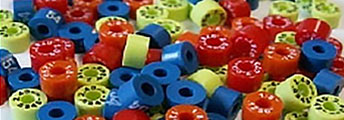Choosing the Right Spindle Parts and Carbide Router Bit for High-Performance Cutting
A single miscalculation in tool selection can cost a manufacturer thousands in scrapped PCBs and lost production time.
According to industry data from the National Association of Manufacturers, precision manufacturing errors account for over
$50 billion in annual losses across U.S. electronics manufacturing.
When your project demands flawless cuts, choosing the right spindle parts and carbide router bit is non-negotiable.
Why Spindle Parts Matter More Than You Think
What many manufacturers don’t realize sooner is that your spindle is only as reliable as its weakest component. Spindle parts are the foundation of your entire cutting operation — not just accessories.
Think about it this way: you wouldn't put cheap tires on a Formula 1 car, right? The same principle applies to precision manufacturing. When you're working with tolerances measured in thousandths of an inch, every component and detail matters.
Midwest Circuit Technology offers AMB and NSK spindles, including models like the 800 FME and 1050 FME series. But what separates successful manufacturers from those dealing with constant downtime is understanding which spindle parts work best for specific applications.
The Carbide Router Bit Revolution
Advances in carbide router bit technology have transformed PCB manufacturing. Five years ago, most manufacturers used basic router bits and accepted mediocre results — but today's specialized carbide formulations have changed the game.
We recently helped a medical device manufacturer switch from standard router bits to our diamond-cut carbide router bit lineup. The result? A 40% reduction in edge chipping and 60% longer tool life. That's the kind of improvement that shows up directly on your bottom line.
Understanding Your Requirements
Before selecting spindle parts and carbide router bits, you need to understand your actual cutting requirements. Are you prototyping PCBs with LPKF or T-Tech machines? Or are you working on aerospace components with tight tolerances?
Different applications demand different approaches. For instance, PCB work typically requires smaller diameter bits (.020" to .250") with specific flute configurations, while aerospace components might need longer reach capabilities.
Where most manufacturers go wrong is trying to use one tool for everything. That's like using a hammer for every job — sometimes it works, but it's never optimal.
AMB and NSK Spindle Systems
AMB and NSK spindles represent the gold standard in precision cutting applications. But even the best spindle won't perform without proper spindle parts support like bearings, collets, and cooling systems.
The AMB 800 FME series excels in lighter-duty applications where precision matters more than power. For heavier cutting or extended run times, the 1050 FME series provides the durability you need.
But what spec sheets won’t tell you is that spindle parts maintenance schedules can make or break your operation. We've seen manufacturers replace entire spindles when simple bearing replacements would have solved their problems.
Carbide Router Bit Selection Guide
| Bit Type | Diameter Range | Best Applications | Key Benefits |
|---|---|---|---|
| Diamond-Cut | .020" - .250" | PCB routing, clean edges | Superior edge quality, longer life |
| Chipbreaker | .031" - .125" | Difficult materials, ceramics | Reduced cutting forces, heat control |
| Standard Carbide | .020" - .250" | General purpose cutting | Cost-effective, versatile |
| Extended Reach | .031" - .125" | Deep cuts, tall components | 2" length, access tight areas |
Up-cut bits pull chips away from the cutting surface, ideal for through-cuts, while down-cut bits push chips down, which is better for surface finishing.
Midwest Circuit Technology stocks both styles in our diamond-cut and chipbreaker configurations — because we've learned that one size definitely doesn't fit all.
The Economics of Quality Tooling
One might argue that spindle parts and carbide router bit options cost more upfront — but smart manufacturers understand that initial cost is just one part of the equation.
Consider this real-world example: a standard router bit might cost $25 and last 500 cuts. A premium carbide router bit might cost $75 but deliver 2,000 cuts with better edge quality. Which is the better investment?
The answer becomes clear when you factor in reduced scrap rates, less downtime for tool changes, and improved surface finishes.
Matching Tools to Applications
PCB prototyping requires different tooling than production runs. For PCB work, we typically recommend carbide router bit diameters from .020" to .125" with up-cut geometries for through-cuts and down-cut options for surface finishing.
For aerospace and medical applications, extended reach carbide router bits for deep cuts and higher-precision spindle parts for tighter tolerances are essential.
Making the Right Choice
Choosing the optimal spindle parts and carbide router bit combination requires understanding your specific requirements, operating conditions, and performance goals. Generic recommendations rarely deliver optimal results.
Midwest Circuit Technology has spent over 30 years helping manufacturers make these decisions. We stock what works and provide custom solutions when standard options don’t meet your needs.
In precision manufacturing, there’s no room for "good enough" – only "optimal" delivers the results your business demands.
Ready to Optimize?
Ready to optimize your cutting performance with the right spindle parts and carbide router bit combination? Contact Midwest Circuit Technology today.
With over 30 years of experience and U.S.-made quality, we provide the precision tools your applications demand. Call us at (330) 995-6900 or visit our Aurora, Ohio facility.
